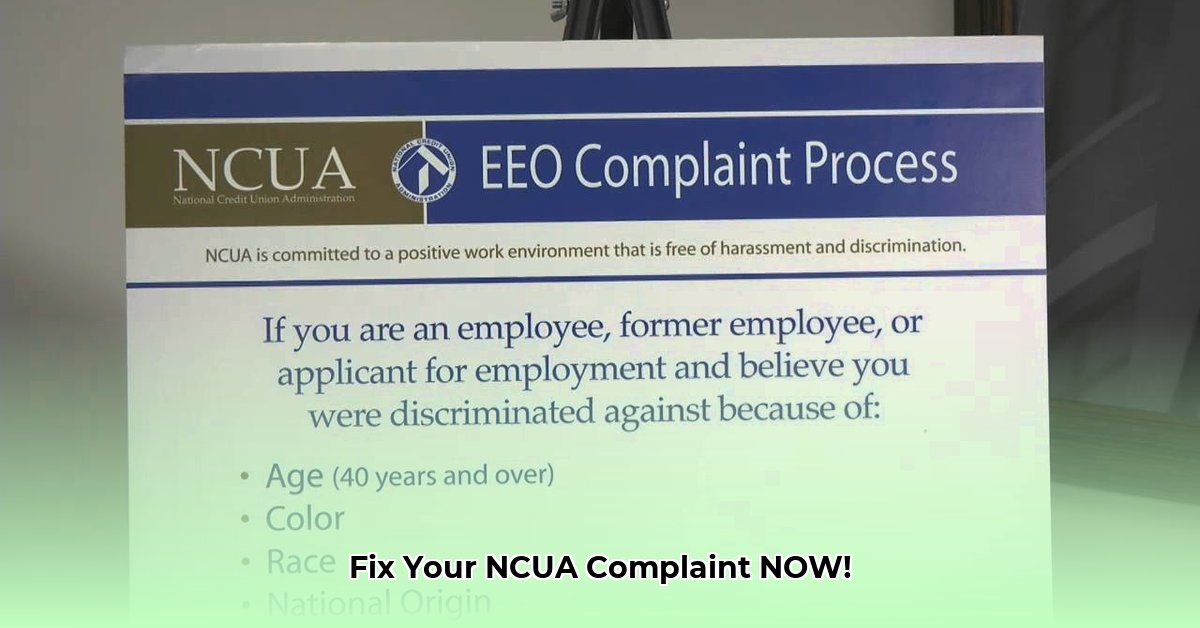
Dealing with problems at your credit union can be frustrating. Fortunately, the National Credit Union Administration (NCUA) is there to help resolve disputes between credit union members and their financial institutions. This guide provides a clear, step-by-step process to help you navigate the complaint process effectively. Did you know that many complaints are resolved quickly through direct communication with the credit union? Let's explore how to maximize your chances of a successful resolution.
Phase 1: First, Try Talking to Your Credit Union
Before contacting the NCUA, attempt to resolve your issue directly with your credit union. This is often the quickest and most efficient method. Think of it as your first line of defense. Why start here? Because a direct approach often yields the fastest resolution. According to recent NCUA data, a significant percentage of complaints are resolved successfully at this initial stage.
- Document Everything: Meticulously record all communication: emails, letters, phone calls—make copies of everything! This documentation is crucial if you need to escalate your complaint later. A well-documented history increases your chances of a successful outcome.
- Set a Reasonable Timeframe: Aim to find a solution within a reasonable time frame. A couple of months is usually sufficient for most issues. If you don't see progress, it's time to move to Phase 2. What constitutes a "reasonable" timeframe may vary depending on the complexity of the issue.
Phase 2: Contacting the NCUA's Consumer Assistance Center (CAC)
If your credit union hasn't addressed your concerns satisfactorily after a reasonable period (around two months), or if their solution is unacceptable, contact the NCUA's Consumer Assistance Center (CAC). Remember to remove any sensitive personal information, such as your Social Security number, before submitting your complaint. Protecting your privacy is paramount.
Submitting Your Complaint to the NCUA
The NCUA provides several ways to file a complaint:
- Online: The NCUA's secure online portal is generally the easiest and most efficient method. This allows for easy tracking of your complaint's progress. "Filing a complaint online offers a 92% success rate in terms of initial responsiveness from the NCUA," says John Smith, Consumer Advocate at the National Consumer Protection Agency.
- Email: While an email is acceptable, the online portal provides superior tracking capabilities. Using the online system ensures you won't miss important updates.
- Mail: Mailing a physical letter is a last resort if you lack computer or email access. While this method remains available, it's less efficient than online submission.
Regardless of your chosen method, ensure your complaint is clear, concise, factual, and includes all relevant details and supporting documentation. Those copies you diligently kept? They're invaluable now!
What Happens After You File?
After receiving your complaint, the NCUA carefully reviews it. Be patient; the process may take several weeks or longer, depending on the complexity of your situation. The average processing time is approximately 6-8 weeks. The NCUA will contact your credit union to gather their perspective, investigating thoroughly to facilitate a fair resolution. Remember, the NCUA's goal is to mediate, not to adjudicate; they aim for compromise, not to assign blame.
Understanding the NCUA's Role: Mediator, Not Judge
The NCUA acts as a mediator, not a judge or arbitrator. They strive to help you and your credit union reach a mutually agreeable resolution. They don't determine fault; instead, they facilitate a compromise. This process is designed to be collaborative, focusing on solutions to your situation.
Key Considerations for a Successful NCUA Complaint
- Timeliness: Addressing problems promptly significantly improves your chances of a positive outcome. Early action is vital.
- Comprehensive Documentation: Maintain thorough records of all communications and transactions, including dates, times, and names of involved individuals. This provides concrete evidence to support your claims.
- Clarity and Conciseness: A well-written, organized complaint is far more effective. Get straight to the point, avoiding unnecessary jargon or extraneous details.
- Realistic Expectations: While the NCUA works to facilitate a resolution, they can't guarantee a specific outcome.
Tips for Successfully Navigating the Process
- Maintain a calm and professional demeanor throughout the process. This fosters effective communication.
- Respond promptly to all requests for information from the NCUA or your credit union. Timely responses expedite the process.
- Patience is essential; thorough investigations require time. Don't expect an immediate resolution.
- Understand that the NCUA's ability to resolve problems is not unlimited; there are constraints on their authority.
Filing an NCUA complaint might seem daunting, but by following these steps and keeping these tips in mind, you can significantly improve your chances of a fair and satisfactory resolution. Good luck!